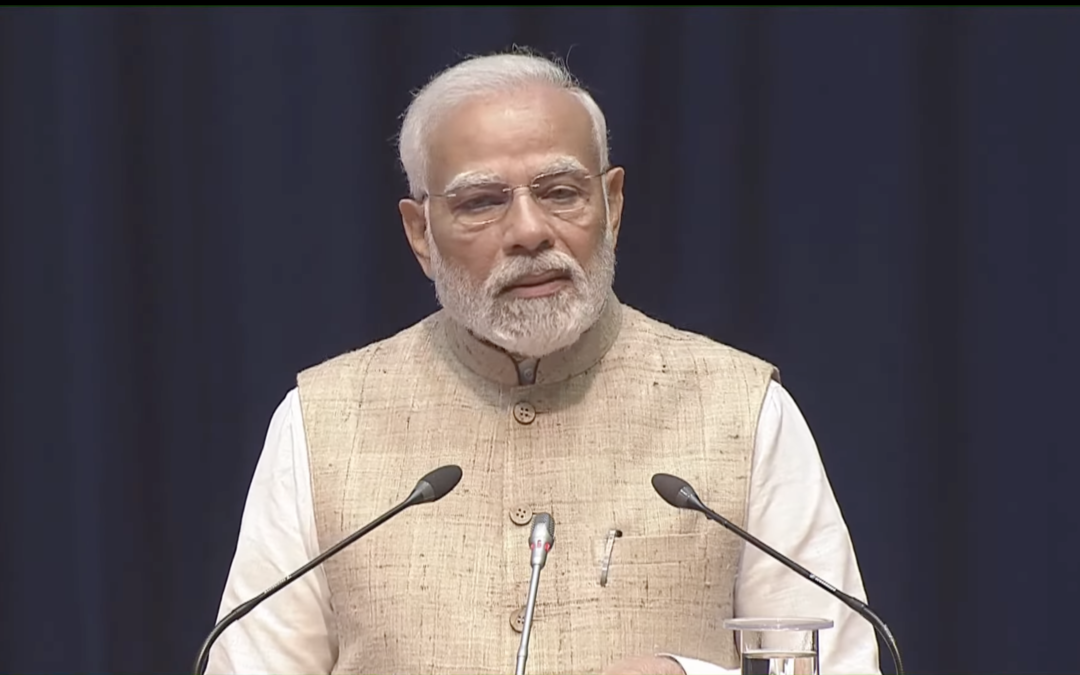In 10 years, India’s capex has grown five times, and the country is also moving fast in green energy and renewable energy sectors, with three times increase in green energy and twenty times in solar energy capacity,Prime Minister Narendra Modi
Gandhinagar:
Prime Minister Narendra Modi on Wednesday said India has emerged as a new ray of hope amid many uncertainties being faced globally, and the world looks at it as an important pillar of stability, a trusted friend and an engine of growth in the global economy.
Speaking at the inauguration of the 10th edition of the Vibrant Gujarat Global Summit, which saw participation of state heads and CEOs of top private companies, Modi said all major rating agencies are of the opinion that India will be among the three largest economies of the world in the next few years.
”’All major rating agencies are of the opinion that India will be among the three largest economies of the world in the next few years,” Modi said, adding that it is his guarantee that the country will achieve this.
The priorities and aspirations of 1.4 billion people of India, their trust in human-centric development, our commitment for inclusivity and equitability, are a major basis for world prosperity and world development, he added.
At a time when the world is surrounded by many uncertainties, India has emerged as a new ray of hope for the world, the prime minister said.
”India’s priorities are clear. India’s priorities are sustainable industry, infrastructure and manufacturing, new age skills, futuristic technology, AI and innovation, green hydrogen, renewable energy, semiconductors and its entire ecosystem,” he said.
If there is so much resilience and growth momentum in India’s economy in a global situation existing today, then the big reason behind this is our focus on structural reforms in the last decade. These reforms have increased the capacity, capability and competitiveness of India’s economy, he said.
India recently celebrated 75 years of its independence, and in the next 25 years it will celebrate 100 years. These 25 years are ‘amrit kaal’ for India for which a goal of making it a developed country has been set, he said.
He said his government has made India’s banking system strong through recapitalisation and use of information technology, ended more than 40,000 compliances through the ease of doing business, GST and global supply chain diversion.
Today, India is making record investment in infrastructure,” he said.
In 10 years, India’s capex has grown five times, and the country is also moving fast in green energy and renewable energy sectors, with three times increase in green energy and twenty times in solar energy capacity.
”In 10 years, cheaper phones and data have brought about a new revolution of digital inclusion. Expansion of optical fibre to every village, and expansion of 5G is changing lives of common India. We are the world’s third biggest start-up ecosystem,” Modi said.
He said the changes happening in India are increasing the ease of living of citizens and empowering them.
”In the five years of our government, more than 13.5 crore people have come out of poverty and the average income of people has increased along with the participation of female workforce, which is a very good signal for India’s future,” he said, and called upon the world to join India’s growth journey.
The government is working to improve logistics and ease of transportation, with the number of airports grown from 74 to 149, national highway network twice, and metro train network thrice in the last ten years, he said.
Companies have also agreed to invest multi million dollars in India’s port infrastructure, he said. UAE’s sovereign wealth fund will begin operation in the GIFT City, and transworld companies are also going to start aircraft and ship leasing activities, he said.
Addressing the event, finance minister Nirmala Sitharaman said India would not only become the third largest economy by 2027-28 but also cross the $5 trillion GDP figure by then.
Speaking at the Vibrant Gujarat Summit Sitharaman said that by 2047 India would have become a $30 trillion economy, though she said this was a conservative estimate.
She said this is possible as the people of India have met with the challenges post Covid and built the recovery on a strong footing.
“One emphasis of achieving the Viksit Bharat goal is to remove the colonial mindset which has been in us and is important for us to get over. People, the states, stakeholders, central government, all of us will have to work to achieve that,” the Finance Minister said.
Sitharaman also highlighted that in the last 23 years of the total Foreign Direct Investment (FDI), $919 billion was received by India, of which 65 per cent – over $595 billion – had come in the last nine years beginning 2014.“Where policies bring greater certainty, convenience, ease of doing business, FDI flows,” the Finance Minister added.
The Finance Minister also counted financial inclusion, Swachh Bharat, open defecation free households, and direct benefit transfer as some of the important milestones and foundational pillars of the Modi government.
She said that Rs 33 trillion has been transferred under the Direct Benefit Transfer, resulting in savings of almost Rs 2.73 trillion for the government because pilferage has been cut down.

